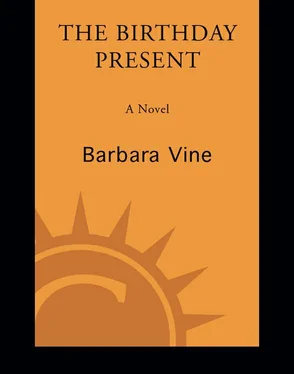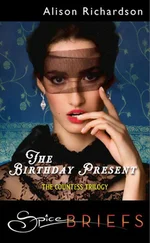Barbara Vine - The Birthday Present
Здесь есть возможность читать онлайн «Barbara Vine - The Birthday Present» весь текст электронной книги совершенно бесплатно (целиком полную версию без сокращений). В некоторых случаях можно слушать аудио, скачать через торрент в формате fb2 и присутствует краткое содержание. Год выпуска: 2008, ISBN: 2008, Издательство: Crown Publishing Group, Жанр: Триллер, на английском языке. Описание произведения, (предисловие) а так же отзывы посетителей доступны на портале библиотеки ЛибКат.
- Название:The Birthday Present
- Автор:
- Издательство:Crown Publishing Group
- Жанр:
- Год:2008
- ISBN:978-0-307-45199-6
- Рейтинг книги:5 / 5. Голосов: 1
-
Избранное:Добавить в избранное
- Отзывы:
-
Ваша оценка:
- 100
- 1
- 2
- 3
- 4
- 5
The Birthday Present: краткое содержание, описание и аннотация
Предлагаем к чтению аннотацию, описание, краткое содержание или предисловие (зависит от того, что написал сам автор книги «The Birthday Present»). Если вы не нашли необходимую информацию о книге — напишите в комментариях, мы постараемся отыскать её.
The Birthday Present
The Birthday Present — читать онлайн бесплатно полную книгу (весь текст) целиком
Ниже представлен текст книги, разбитый по страницам. Система сохранения места последней прочитанной страницы, позволяет с удобством читать онлайн бесплатно книгу «The Birthday Present», без необходимости каждый раз заново искать на чём Вы остановились. Поставьте закладку, и сможете в любой момент перейти на страницу, на которой закончили чтение.
Интервал:
Закладка:
I asked Iris what Ivor meant by “appropriate for his purpose.”
‘The right atmosphere,' was what he said. I didn't ask what sort of atmosphere he wanted.”
“I don't suppose we shall ever know,” I said.
WE'D BEEN INVITED to the theater by Ivor that evening and we looked on it as a celebration for him. He had just been made a whip. The play was Julius Caesar, with a famous theatrical knight as Brutus and Nicola Ross playing Calpurnia. After it was over we all went round to Nicola's dressing room to have champagne and take her out to supper. It wasn't my business even to wish it, but I couldn't help reflecting how much better it would be if she and Ivor were still together and it was she he was thinking of living with. After a minute or two the young black actor playing Casca put his head round the door and Nicola called him in. She introduced him as Lloyd Freeman, and we were soon all talking about black people taking parts that had been intended for white actors. Was it a problem? If audiences could suspend their disbelief in middle-aged women playing Juliet and fat divas singing tubercular Mimi, why not accept a black Mark Antony? Lloyd said he was lucky to have the part he had, but he'd only got it because it was a very small one. Could we imagine him in a Pinero revival, for instance?
We talked about black and Indian characters in books all being comic or evil up to World War II and beyond, and Othello the only serious role for a black man, and I was starting to wonder how Lloyd made a living, when he said he also drove for a minicab company in which he was a partner with a friend. Ivor was interested—Iris and I agreed afterward that he probably wanted to use one of these minicabs for taking Hebe home after their meetings—and Lloyd gave him a card. After that Lloyd went home and we went off to supper.
I never saw him again, and I don't suppose I ever gave him a thought until the time of the accident. The papers had photographs of him too, though not so many as of Hebe. He was a good actor, and whenever I see a play on the West End stage with black people in the cast I think of him. Because the impossible, which was the view he took, has happened. I saw a black Henry V last year and a black Henry VI last week, and I thought how I might have seen Lloyd in Julius Caesar again, but playing Cassius this time. I never can because he's dead. It wasn't Ivor's fault that he died, but without Ivor he'd no doubt be alive today. He was thirty-two, so he'll have to age another year when he gets to heaven.
The other man, Dermot Lynch, I never met. I heard his voice once when I was in Ivor's flat. He had come around to collect Ivor's car and take it away for a service. “I'll pop the keys through the door as per usual, guv,” I heard him say, and I wondered whether Ivor, who expected to be called “sir,” would object to being addressed like a police inspector in a sitcom. He can't have minded much, because Dermot Lynch was the other man he chose to carry out the birthday present.
I shall call it that now because it's as “the birthday present” that Iris and I referred to it, rather than as “the accident,” whenever we spoke of it in the future. Back in the early part of 1990, of course, we had no idea what Ivor was planning, only that he wanted our house on the nearest Friday to May seventeenth, and after a time we gathered this was Hebe's birthday. He bought her a present as well, a string of pearls, and, in an unusual display of openness, showed it to us.
“They're beautiful,” Iris said, “but the trouble with pearls is that you have to be an expert to tell whether they're worth thousands or they came from a chain store.”
“That's not the trouble,” Ivor said. “That's the point. She can wear them and Furnal won't know she didn't buy them herself.”
IVOR WAS A good constituency MP. Even after he got to be a minister he still went down to Ramburgh most weeks to hold his Morningford surgery on a Saturday morning. If the weekends he spent in London were usually free, the ones in Norfolk weren't. Especially in the summer, there would be an appearance to put in at some local festival or f^te and often a dinner to attend and speak at in the evening. There was always a cause that needed his patronage or a concern one of his constituents wanted raised with the relevant minister. At the time of the birthday present or just before it was the proposal to close a local hospital, the kind of place they used to call a “cottage hospital,” he was opposing. He'd attended all the meetings of the Hands Off Our Hospital committee but he drew the line at taking part in the march through Morningford culminating in a mass demo in the town square. It was a Conservative government that supported the hospital closure and he was, after all, a Conservative whip. As he put it, he didn't want the wrong sort of limelight. He was very aware of this sort of thing, perhaps neurotically aware.
When he visited his constituency he stayed at Ramburgh House with his parents, a place considered by John and Louisa to be as much his as theirs. They had told him that when he married they would give it up to him and move into the lodge, quite an attractive but much smaller house at the eastern end of the estate. It seemed to me that they were safe for years, as marriage was the last thing on Ivor's mind.
Ramburgh House was a biggish Queen Anne place, one of those manor houses that stand in the center of the village, separated from its main street only by a narrow strip of grass and paving and approached through an arch in a high brick wall. All the land, the garden, the park, and a couple of meadows and woodland were at the rear, and the lodge stood about half a mile away, at the end of what they called the East Avenue, a lane running between a double row of lime trees. It's a measure of Ivor's old-fashioned (and slightly absurd) sense of the dignity due to the landed gentry that he called the lodge “the dower house.”
I don't suppose there is anything particularly remarkable about the grounds—the land is flat, its only distinguishing feature the little river running between rows of alders—and the house itself gets only a terse paragraph in Pevsner's Buildings of Norfolk. But Ivor was very fond of the place and, if his father behaved like a squire of old, he conducted himself a bit like the heir apparent, having the vicar and his wife to dinner and dropping in on the locals to hear their complaints about rents and repairs. Now, of course, most of the locals have died and the places they lived in have become weekend cottages for Londoners.
Our own cottage was ten miles away but well within Ivor's constituency. We voted in Hampstead and we had the right to vote in local elections, though not in parliamentary ones. It wasn't easy for us to attend any of those functions Ivor spoke at, but we did manage to get along to the Morningford Eel Feast, an annual thrash in the town hall whose origins were lost in antiquity. Traditionally, only local eels were consumed, but these had become scarce over the years and it was rumored that half of those eaten at the April 1990 feast came from Thailand. I don't know if there are any eels in Thailand or if we import them if there are, but this was the story that went around the tables that year. Iris and I were able to go because the feast happens at lunchtime, so we could take Nadine with us.
Ivor made a speech, a very good speech I suppose it was, with the requisite eel jokes and stories about the glorious past of Morningford and its even more illustrious future, nothing about the hospital closure but rather a lot about the benefits the then government had brought to the town. Just the same, I wasn't sorry when Nadine started to grizzle and then to scream and we had to take her out. I heard afterward that there had been one or two sticky questions put to Ivor, the most awkward being how long would Margaret Thatcher remain prime minister. Apparently, he got around it by heaping praise on her.
Читать дальшеИнтервал:
Закладка:
Похожие книги на «The Birthday Present»
Представляем Вашему вниманию похожие книги на «The Birthday Present» списком для выбора. Мы отобрали схожую по названию и смыслу литературу в надежде предоставить читателям больше вариантов отыскать новые, интересные, ещё непрочитанные произведения.
Обсуждение, отзывы о книге «The Birthday Present» и просто собственные мнения читателей. Оставьте ваши комментарии, напишите, что Вы думаете о произведении, его смысле или главных героях. Укажите что конкретно понравилось, а что нет, и почему Вы так считаете.











